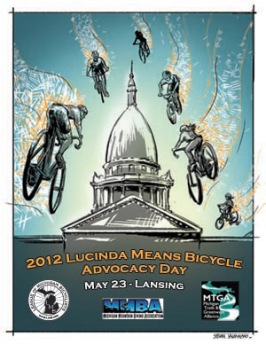You are currently browsing the tag archive for the ‘Advocacy Day’ tag.
Stand up for Complete Streets and the preservation of non-motorized funding at the 2012 Lucinda Means Bicycle Advocacy Day on May 23rd.
Bicyclists and Complete Streets supporters will meet with members of the Michigan Legislator on May 23rd at the State Capitol to advance legislative priorities aimed to make Michigan a more bicycle-friendly state. The event will be hosted by the League of Michigan Bicyclists, Michigan Trails and Greenways Alliance and Michigan Mountain Biking Association. All non-motorized transportation advocates are encouraged to participate.
Their Advocacy Agenda (PDF) includes a number of items such as establishing vulnerable roadway user designations for bicyclists, pedestrians and wheelchair users to create enhanced penalties for drivers who injure or kill a vulnerable roadway user. Advancing bikes-on-trains is another top priority. Roll-on bike service would allow cyclists to take bicycles on-board Michigan Amtrak trains, making multi-modal travel easier in Michigan. This would extend Complete Streets principles of connectivity further than a communities geographic boundaries by linking local bicycle networks and passenger rail service.
Also included in the Advocacy Day agenda are a few bills that are raising the eyebrows of Complete Streets advocates across the state. SB 921 (Ouiment) and HB 5304 (Jansen) were both recently introduced as part of Governor Snyder’s transportation funding reform proposals. Language in these bills, needlessly eliminates the Michigan Complete Streets Advisory Council (MCSAC). The Council, comprised of representatives from 18 statewide government and non-government stakeholder agencies, was created as a result of Public Act 135 of 2010. It is charged with providing education and advice to the State Transportation Commission (STC), county road commissions, municipalities, interest groups, and the public on the development, implementation, and coordination of Complete Streets policies.
To date, the MCSAC has focused its efforts solely on drafting recommendations for the STC regarding the statewide policy for MDOT. As a result, little guidance has been provided to local units of government across the state.
While Michigan leads the nation with the most adopted Complete Streets ordinances and resolutions (over 70 in total), many communities are still hesitant to advance Complete Streets until the MCSAC provides further recommendations. The MCSAC provides valuable oversight and guidance for the effective implementation of Complete Streets throughout the state. Dissolving the MCSAC will create an unfortunate void for communities seeking to make their roads and streets safer for all users. The collective expertise of MCSAC should continue to be utilized as MDOT and local communities work to implement the finalized policy.
Another bill of concern is HB 5303, which removes a funding requirement from Act 51 that obligates communities and road agencies to spend a minimum of 1% of their transportation funding on essential non-motorized transportation projects.
Worse yet, HB 5303 includes provisions that reward funding to road agencies based on the number of Vehicle Miles Traveled (VMT) under their jurisdiction. This creates disincentives for investments in alternative transportation options such public transit systems and bicycle networks.
The bill penalizes communities and road agencies for making systemic improvements like “road diets,” a popular technique that reduces the number of travel lanes on roads designed to carry more vehicle traffic than they do in reality. A common “road diet” improvement converts four-lane roads that have lower traffic volumes into two-lane roads that also include center turn lanes and additional safety features such as bike lanes, creating new transportation options without causing additional congestion.
You can learn more about these issues and register for the 2012 Lucinda Means Bicycle Advocacy Day at www.LMB.org/advocacyday.
 Registration is now closed for the League of Michigan Bicyclists, Michigan Mountain Biking Association and Michigan Trails and Greenways Alliance 2010 Lucinda Means Advocacy Day on May 26. 85 bicyclists from across the state will be meeting in person with their representatives to voice their support for Complete Streets legislation, Michigan House Bills 6151 and 6152. If you’re unable to attend the event, you can still help out fellow bicyclists by participating in our virtual lobbying day.
Registration is now closed for the League of Michigan Bicyclists, Michigan Mountain Biking Association and Michigan Trails and Greenways Alliance 2010 Lucinda Means Advocacy Day on May 26. 85 bicyclists from across the state will be meeting in person with their representatives to voice their support for Complete Streets legislation, Michigan House Bills 6151 and 6152. If you’re unable to attend the event, you can still help out fellow bicyclists by participating in our virtual lobbying day.
GUIDE TO VIRTUAL LOBBYING:
Step 1
Sign our predrafted email to House Transportation Committee Members expressing your support for HB 6151 and 6152. Please put your first and last name in the “Name” field. You are also encouraged to personalize the message using the “Personal Statement” field. The email form can be found at http://citizenspeak.org/node/2032 (this link has been disabled).
Step 2
Call your representative – the combination of face-to-face and phone communications in support of the bills will demonstrate a strong and unified Michigan voice. By putting in your 10-digit zip code at www.votesmart.org, you can determine who your legislators are and find their phone numbers.
We encourage you to use the talking points below to send your own alert encouraging your members to participate.
TALKING POINTS:
- Complete Streets ensure that our roads are safe, more livable, and accessible to people of all ages and abilities.
- Complete Streets boosts the economy by increasing residential property values and facilitating retail and commercial development.
- Complete Streets improve safety and reduce crashes by providing pedestrian and bicycling infrastructure, such as safe crossings, sidewalks or on-road bicycle lanes.
- Complete Streets promote public health by making it safe and convenient for children and families to incorporate physical activity into their daily lives.
KEY FACTS:
- The 2001 National Household Transportation Survey reported that 50 percent of all trips in metropolitan areas are 3 miles or less, and 28 percent are 1 mile or less.
- Complete Streets policies have been adopted in 21 states, including Illinois, Minnesota and Wisconsin.
- A study in Houston found that 3 out of 5 disabled and elderly citizens do not have sidewalks between their home and the nearest bus stop.
For more specific information, please download our Complete Streets fact sheet. The National Complete Streets Coalition site also has great fact sheets by issue area if you need additional resources.















